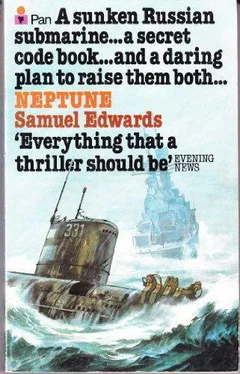Samuel Edwards - Neptune
Здесь есть возможность читать онлайн «Samuel Edwards - Neptune» весь текст электронной книги совершенно бесплатно (целиком полную версию без сокращений). В некоторых случаях можно слушать аудио, скачать через торрент в формате fb2 и присутствует краткое содержание. Город: London, Год выпуска: 1978, ISBN: 1978, Издательство: Pan Books, Жанр: Шпионский детектив, Триллер, на английском языке. Описание произведения, (предисловие) а так же отзывы посетителей доступны на портале библиотеки ЛибКат.
- Название:Neptune
- Автор:
- Издательство:Pan Books
- Жанр:
- Год:1978
- Город:London
- ISBN:0-330-25006-X
- Рейтинг книги:4 / 5. Голосов: 1
-
Избранное:Добавить в избранное
- Отзывы:
-
Ваша оценка:
- 80
- 1
- 2
- 3
- 4
- 5
Neptune: краткое содержание, описание и аннотация
Предлагаем к чтению аннотацию, описание, краткое содержание или предисловие (зависит от того, что написал сам автор книги «Neptune»). Если вы не нашли необходимую информацию о книге — напишите в комментариях, мы постараемся отыскать её.
The Russian atomic submarine ZOLOTO lies crippled and abandoned on the bed of the South China Sea. The secrets entombed inside are vital to both east and west. A custom-built super-dredger NEPTUNE assembled under maximum secrecy and plagued by agents of Soviet Russia and Red China, is bound on a clandestine salvage operation to capture the prize that could mean nothing less than world domination…
Neptune — читать онлайн бесплатно полную книгу (весь текст) целиком
Ниже представлен текст книги, разбитый по страницам. Система сохранения места последней прочитанной страницы, позволяет с удобством читать онлайн бесплатно книгу «Neptune», без необходимости каждый раз заново искать на чём Вы остановились. Поставьте закладку, и сможете в любой момент перейти на страницу, на которой закончили чтение.
Интервал:
Закладка:
There was little that men could do other than wait and watch. Two of Franklin Richards’ lieutenants went to the open aft hold to make certain its sliding metal cover would function properly after the Zoloto was made secure in her niche. At 7.05 p.m.
Captain Humphries conferred by telephone with Richards, and the latter then ordered the raising of the hydraulically operated, electromagnetized cranes.
The roll of the Neptune immediately became more pronounced, and she began to pitch erratically. Waves were beginning to break over her bow, and occasionally one that was as powerful as it was unpredictable slapped against her side, causing the whole vessel to shudder.
The rain, which had been gentle, was falling in a sheet now, and the wind blew it almost horizontally, causing a drumming sound as it beat against the thick glass of the operations centre. The daylight continued to fade prematurely, and at 7.18 p.m. the Captain ordered all floodlights turned on.
A thin, white line showed around Franklin Richards’ mouth, but he betrayed no other signs of nervousness, and the staff took courage from his apparent calm.
At 7.23 an unseen underwater current struck one end of the submersible, tipping it, and the Zoloto rolled to one side.
There was nothing the men on the Neptune could do to correct the condition. They breathed more easily as the float righted itself. The electromagnets continued to hold the submarine in place, even though it was off centre, but everyone knew that another current might cause it to fall overboard and sink to the bottom again.
Finally, at 7.31 p.m., Richards gave the order that had been awaited since the start of the operation. ‘Lower your claw-cranes,’ he said.
The balance of the Neptune was disturbed as the cranes dipped down into the sea off the fantail, and the ship pitched even more violently. Although the floodlight beams were the most powerful man could devise it was impossible to see clearly through the pelting rain.
The magnetized cranes needed no human help, however, and finding their target beneath the surface, they closed around it.
Richards waited until he was certain the grip was secure. ‘Jettison submersible’s gasoline,’ he directed.
The float, growing lighter by the second as her petrol drained into the sea, rose more rapidly to the surface, giving the cranes assistance.
‘Cut off electromagnetic lines to the submersible,’ Richards ordered.
Only the cranes held on to the submarine now.
‘Bring your cargo on board!’
The cranes rose into the air, cradling the Zoloto of more than 6,000 tons gross weight.
The typhoon mocked the efforts of mere men, and winds of force II velocity struck in repeated gusts, causing the Neptune to roll and pitch perilously.
But the cranes did not release their cargo, even though the bow rose high out of the water, then plunged abruptly until it was almost completely submerged. The automated equipment performed flawlessly, and the submarine was lowered into the open hold.
‘Close your hatch over!’ There was hoarse triumph in Richards’ voice.
The Zoloto 14-2967 was safely on board, the cranes were retracted and the closing cover made the prize secure.
But the battle was not yet ended. Franklin Richards wanted to salvage his football field, which was still attached to the mother ship by a number of lines and cables.
The storm was not to be denied at least one victim, however, and one by one the lines were torn loose in the shrieking gale.
The voice of Captain Humphries came over the intercom. ‘Frank,’ he said, ‘your submersible is breaking up. There’s no way to save it.’
Richards merely shrugged as the storm smashed the float, reducing a marvel of ingenious human design to bits of metal and wire, cloth and wood, that were scattered in the South China Sea.
The rescue of the sunken submarine was completed against odds that no man could have imagined, but there was no elation. Franklin Richards hurried off to his suite, where he was violently seasick, and many of the others, including Adrienne, followed his example.
Porter was one of the few who remained in the operations centre, and clinked champagne glasses with Marie Richards. But even those who remained on their feet were too bone-weary to celebrate.
The storm did not begin to abate until mid-morning, and a weary Captain Humphries notified his Navy escort of his position. They sailed at full speed to rejoin him, and as the clouds began to dissipate the Air Force squadrons once again appeared overhead.
Adrienne was still in bed, recovering from the effects of her illness, so Porter took complete charge of the security operation. Corporation representatives were stationed in the aft hold and on the deck above it, all of them armed with sub-machine guns and under orders to halt the approach of anyone other than authorized personnel.
Two distinguished nuclear physicists, accompanied by a senior scientist on the staff of the Atomic Energy Commission, went into the hold, remaining for several hours. Thereafter they maintained complete silence regarding their findings, and neither then nor later did anyone, including Franklin Richards and others who had participated in Project Neptune, learn whether a Russian atomic bomb had been recovered.
The trio had scarcely emerged when two of America’s top code experts went below. They stayed for the better part of the afternoon, by which time the sun was shining again in a serene sky. Like their nuclear energy colleagues they, too, said nothing, and it was impossible for anyone to discover whether they had come across the Russian naval code that the President and National Security Council had regarded as being easily as vital as the salvaging of an atomic device.
Not until early in the evening did a team of undertakers and their assistants go to the hold, carrying stacks of coffins. They were also under orders not to talk, and nothing was said regarding the number of the Zoloto’ s dead crew they prepared for burial. Subsequently the White House would decide whether, in the spirit of detente, the bodies would be returned to the government of the Soviet Union.
The Corporation guard was maintained without a break on the uneventful voyage to Honolulu. Additional Navy ships joined the escort, and the flotilla arrived at the Pearl Harbor Navy base without fanfare. There the Zoloto was dismantled and its contents were returned to the mainland by Air Force cargo planes.
Many of the civilians left the Neptune at Pearl Harbor, among them the entire Corporation contingent. Franklin and Marie Richards gave a quiet party for the entire company before it dispersed, but no speeches were made, and the gaiety was a trifle forced. Regardless of whether an atomic weapon and the Russian naval code had been recovered, no one could forget the coffins stacked in the hold.
If Hawaii was heaven on earth, the citizens of Kauai privately regarded their island, located at the northern end of the archipelago, as the only true paradise. Their waterfalls were more spectacular, their vegetation more verdant, their beaches cleaner and less heavily populated than those found elsewhere in the state. Kauai, in fact, was perfect for people who sought isolation.
The cottage, sturdily built and boasting every modern household convenience, stood on a high rise overlooking the sea, and was cooled by the trade winds. It had its own private beach, a boat was anchored in its tiny, sheltered harbour, and the fishing in a river that raced to the ocean was easily as good as that in Cornwall.
Behind the house was a garden filled with banana and pineapple palms, breadfruit and citrus trees, all producing in such quantities it was impossible to eat everything that grew there. Rising high in the distance was the island’s only peak, Mount Waialeale, and every afternoon white clouds formed around the top of the mountain.
Читать дальшеИнтервал:
Закладка:
Похожие книги на «Neptune»
Представляем Вашему вниманию похожие книги на «Neptune» списком для выбора. Мы отобрали схожую по названию и смыслу литературу в надежде предоставить читателям больше вариантов отыскать новые, интересные, ещё непрочитанные произведения.
Обсуждение, отзывы о книге «Neptune» и просто собственные мнения читателей. Оставьте ваши комментарии, напишите, что Вы думаете о произведении, его смысле или главных героях. Укажите что конкретно понравилось, а что нет, и почему Вы так считаете.












